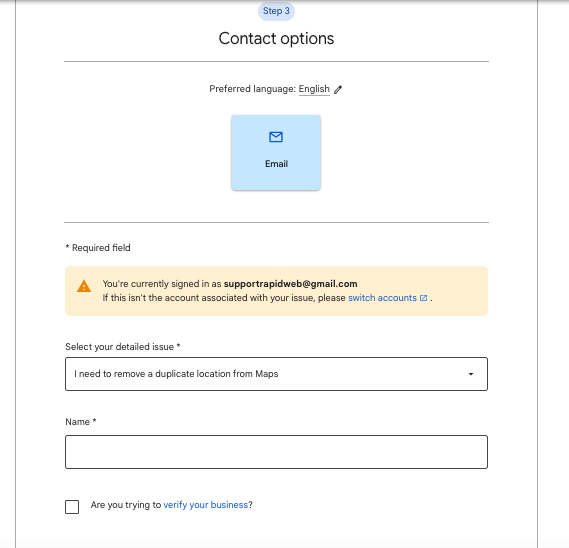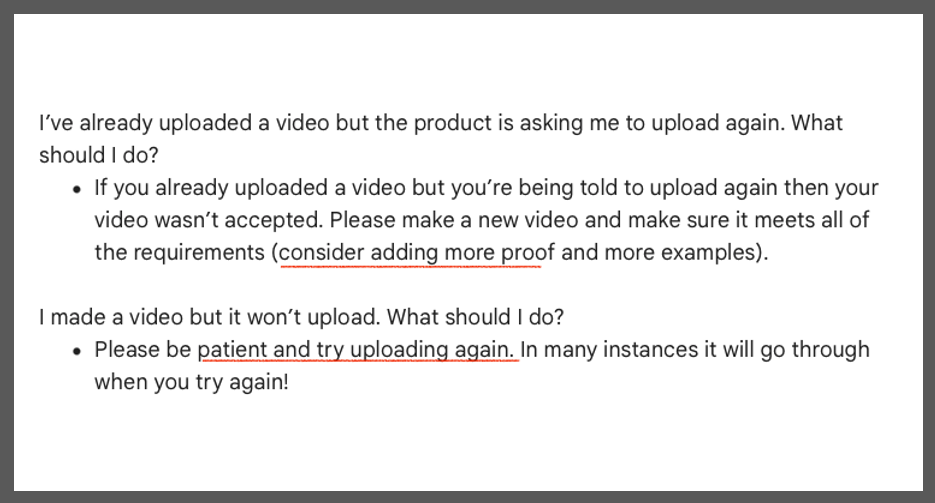GBP Deduping Form, Video Verification Clarification, GBP Scams Galore

Deduping GBP Profiles: There's a Form for That!
Google Maps' knowledge graph includes 200 million business listings and captures them from multiple trusted data suppliers and other sources. Inevitably, there will be two listings for the same business on occasion. Google now does a surprisingly good job of deduping the index. That wasn't always the case. In the pre Knowledge Graph days weird listing mergers were the order of the day. Today, you rarely see wrong merges but you occasionally see duplicates reported. They happen when the Google algos are not able to match two records because key fields are too far apart. This can happen when a service area business (SAB), for example, with a hidden address might also have a listing sourced from a third party with the address shown; or when two listings are verified by different users and Google won't merge them. Regardless, getting rid of these duplicate listings has historically been hard. Now there's a form for that, something I have been saying a lot lately. Go to the support form, choose your business, tell Google you have a "duplicate." Select the “Duplicated Business” button, skip by the resources by clicking next a few times and, voila, you arrive at a form specifically for this issue.

Our take:
- The rapid rollout of new, detailed forms indicates Google has long known the specific issues that plague GBP users.
- It's likely that these many new forms are a response to the DSA and P2B regulations now in force in Europe. Businesses worldwide are benefiting.
- It's not clear whether this is merely "customer support theater" or whether these new forms will lead to better GBP support outcomes.
Google Comes Clean(ish) About Video Verification
Last week in the forum, the Google Business Profile (GBP) Community Manager published a Video Verification Troubleshooting & FAQs post. It was as close as Google ever comes to admitting that their technology is problematic. Video verification has failed routinely and been the subject of increasing complaints in the forum. The process often doesn't work at all or fails when 99% complete. Users might make 10 or more attempts, and if the video does make it through the upload, it will remain in a veritable verification purgatory. Reading tea leaves is a necessary skill when trying to understand Google's statements. I interpret this one (below) to mean: "We are using AI to analyze the video you uploaded" and "the AI pipeline fails regularly, part way through, without any messaging. So give it the old college try, over and over again." Although, there is now a support form for that.

Our take:
- GBP AI-first moderation of images caused similar issues with the images not approved bug.
- Google's "build it, test it on real businesses and maybe fix it sooner or later" approach shifts the burden to overextended SMBs.
- Likely because of EU regulation, there is now a specific support flow and form to raise the issue of video upload failures. How well Google handles these support issues remains to be determined.
Robocalling Not Only B2B Scam in Maps
Last week Hiya, a company that tracks phone fraud and spam, reported there were more than 2,000 scam calls per month pitching small businesses on verifying their free Google Business Profile (GBP) listings. At the current rate, there will be close to 27,000 of these calls this year alone. They're a visible example of the abuses around Google Maps. Indeed, Maps has become a magnet for both B2B and B2C scams. On the B2B front, there are review extortion scams, fake review attacks, companies selling calls from fake listings to lead-gen clients and random and frequent spammer requests for listings ownership. The fact that we felt compelled to write a guide to fighting fake review attacks on Maps speaks volumes. And this doesn't account for the Google sanctioned efforts by the Grubhubs of the world to take a cut of every restaurant order, without consent. The biggest scam of all is Google knowing of the many abuses committed with its products and doing almost nothing. Time after time Google makes the same excuses, while SMBs pay the price.

Our take:
- Google handles each of these systemic abuses as one-offs and the press seems to blithely accept that thread-bare story.
- The costs of these scams to both small businesses and consumers are immense, but often hidden or unaccounted for.
- EU's Digital Services Act, targeting some of these abuses, went into effect last week. Google is complying; we'll have to see how it goes.
Recent Analysis
- Near Memo episode 125: SMBs search to find services, GBP support bends to European regs, No copyright for AI
- ICYMI: Overture Drops Free Global Dataset with 60M Places, by Greg Sterling
Short Takes
- Google's SGE local 5 pack gets additional brand links.
- The GBP rollout of social links/profiles is reportedly 50% complete.
- GBP "feature/bug": Google auto inserts random images as profile image.
- Whitespark's guide to how fake review fighting can boost rankings.
- Toilet paper will be dropping from the sky, as Walmart partners with Google to expand drone delivery near Dallas.
- Google Ads to charge SMBs twice as they roll out 'enhanced' customer service. Will they also be upselling?
- Grocers seek to expand into restaurant spending, as 20% of consumers bought restaurant meals online while shopping.
- Google no longer displaying anonymous reviews. (LSA reviews also optional.) They have a long way to go to clean up fake LSA reviews.
- Google's Review Place Topics offers insights into common diner themes in restaurant reviews.
- Brightlocal guide to escalating GBP issues to the Google forums.
Listen to our latest podcast.

How can we make this better? Email us with suggestions and recommendations.
